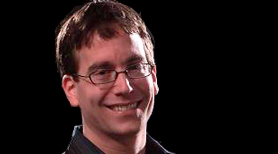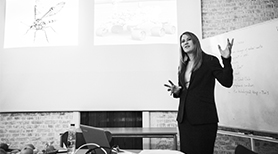Open Academy is an ongoing public event at Kunst og Teknologi | Art and Technology.

Guest Lecture byProfessor Todd Murphey: Sequential Action Control for Human-in-the-Loop Systems
Guest lecture by Professor Todd Murphey, Neuroscience and Robotics Laboratory, Northwestern University.
Time
20.05.2016 kl. 14.00 - 15.00
Description
Sequential Action Control for Human-in-the-Loop Systems
Supporting operator goals in human-in-the-loop systems is a key challenge facing collaborative robotic systems, one that requires control architectures that take into account the physics of the machine while enabling an operator to incorporate domain knowledge about a task. We have developed a nonlinear control method called sequential action control based on the assumption of human-in-the-loop situations. This control approach assumes that, although one has a long time horizon understanding of the physics of a machine, one is unlikely to have a long time horizon understanding of an operator's behavior. Sequential action control has the advantage of being well-posed and closed-form for the majority of nonlinear and hybrid control systems. As a consequence of these new algorithms, we have been able to create real-time interfaces where an operator can never fail at a task, and have been able to implement these algorithms on minimal computing platforms such as mobile phones. In situations where the interface cannot guarantee success, we can incorporate feedback to the operator to improve both performance when feedback is present and training effects when the feedback is removed. Moreover, we have incorporated computational notions of trust in the operator - that is, how much the machine trusts the decision-making capacity of an operator - into run-time control. This leads to higher efficiency both for expert and novice operators.
Dr. Todd D. Murphey:
Dr. Todd D. Murphey is an Associate Professor of Mechanical Engineering at Northwestern University. He received his B.S. degree in mathematics from the University of Arizona and the Ph.D. degree in Control and Dynamical Systems from the California Institute of Technology. His laboratory is part of the Neuroscience and Robotics Laboratory, and his research interests include computational methods for mechanics and real-time optimal control, physical networks, and information theory in physical systems. Honors include the National Science Foundation CAREER award in 2006, membership in the 2014-2015 DARPA/IDA Defense Science Study Group, and Northwestern's Charles Deering McCormick Professorship of Teaching Excellence. He is a Senior Editor of the IEEE Transactions on Robotics.
Host
The Faculty of Humanities and the Faculty of Engineering and Science
Address
NOVI Auditorium, Niels Jernes Vej 10


